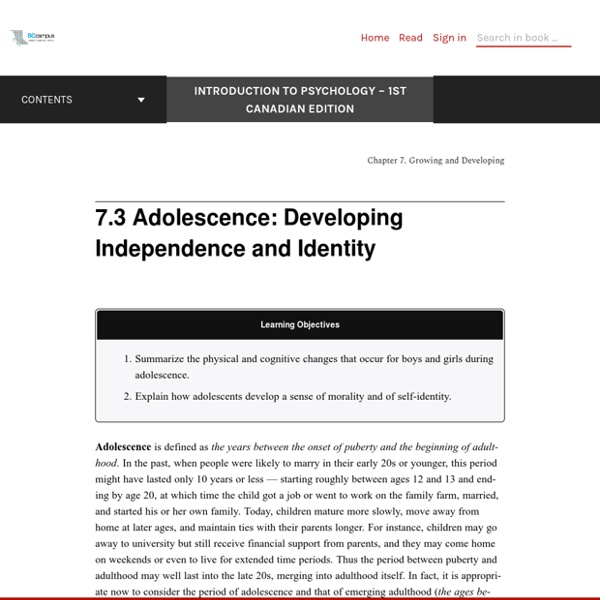Five Ways to Help Teens Feel Good about Themselves
No one wants to hang out with me. I’m a failure at school. All my other friends seem happy.
Identity and Adolescents: How Adults Can Help
By Cheryl Jones, ACSW, Adolescent and Family Counselor This is an article that was printed in The Fourth and Fifth Rs: Respect and Responsibility, Volume 10, Issue 2, Winter 2004. (Center for the 4th and 5th Rs, School of Education, Cortland, NY 13045 www.cortland.edu/c4n5rs The elder of two daughters, Sarah barely talked to her family anymore. She was doing poorly in school, and her previously good friends were replaced with kids who were drinking and using drugs.
How Can I Improve My Self-Esteem? (for Teens)
What Is Self-Esteem? Self-esteem means feeling good about yourself. People with self-esteem: feel liked and accepted are proud of what they do believe in themselves People with low self-esteem: feel bad about themselves are hard on themselves think they are not good enough
The Associations Between Cultural Identity and Mental Health Outcomes for Indigenous Māori Youth in New Zealand
Introduction Rangatahi Māori, the indigenous youth of New Zealand experience significantly poorer mental health outcomes compared to Pākehā/NZ European youth (1–7). Rates of serious depressive symptoms are similar (Māori 13.9%, NZ European 12.1%), but Māori youth report considerably higher prevalence of suicide attempts (Māori 6.5%, NZ European 2.7%) and poorer general wellbeing (Māori 10.5%, NZ European 6.8%) compared to their peers (1).
Why Is Teen Identity Development Important?
Though it can be hard for parents to let go and acknowledge their teen needs external help, a credible adventure therapy program can relatively quickly and positively change your son or daughter’s life for the better. Psychologist Erik Erikson advocated that teen identity development is fostered by experiences that allow individuals to express their individuality and receive feedback and validation from others. Adventure therapy programs provide experiences that promote healthier relationships and positive identity formation in teens. A credible adventure therapy program can also positively affect a teen’s self-perception, confidence, and leadership skills by providing unique experiences and challenging opportunities that develop competence and confidence from within. Wilderness Therapy Promotes Healthy Teen Relationships The activities of a wilderness therapy program include unique experiences such as rappelling, rock climbing, and mountain biking.
Your Teen's Search for Identity
Their bodies kick into overdrive. They find themselves disoriented, scared and alone. They become moody, secretive and sarcastic.
6 Ways You Make a Difference as a Parent
Real Families. Real Hope. Offer God's hope to hurting families. Yes, I will help struggling families!
7 Ways to Help Teens and Tweens Gain Self-Awareness
Self-awareness is an important quality for tweens and teens with learning and thinking differences to develop. Self-awareness can help your child come to grips with his issues and understand how they affect him in school and elsewhere. Encourage your child to speak openly about his issues. Tweens and teens with learning and thinking differences can be quick to criticize themselves. But self-awareness means recognizing positives as well as negatives.
Ethnic and Racial Minorities & Socioeconomic Status
Socioeconomic status (SES) encompasses not just income but also educational attainment, financial security, and subjective perceptions of social status and social class. Socioeconomic status can encompass quality of life attributes as well as the opportunities and privileges afforded to people within society. Poverty, specifically, is not a single factor but rather is characterized by multiple physical and psychosocial stressors.
Teenage Self-Identity Issues: Causes, Problems, And Common Behaviors
While there are a variety of ways that teens experience identity formation, some experiences can become very harmful to the individual. In the sections below, we discuss the causes and more serious issues in teenage identity issues & development and how parents can help. Common Causes Contributing to Unhealthy Teen Identity Development
Six Ways to Build Your Teen's Identity - Focus on the Family
DONATEStrengthen families withyour gift GIVE MONTHLYHelp fund our ministryprograms Menu
How To Help My Young Adult with Identity Development
“I am most excited about the freedom that I will have when I graduate from high school. The freedom that I am searching for is not to escape my family or anything of the sorts, but the freedom of going to a college and being myself.” - Lexie, Class of 2017, Summersville, WV Throughout their lifetime, your kids have been developing a sense of self, of identity, and self-awareness. You may have even noticed they became increasingly self-aware around puberty or around the 13-14 age range. But there is perhaps no greater time of identity development than in the years following high school.
7 Ways to Help Build Your Teen's Self-Esteem
Today’s teenagers are confronted with a variety of tough issues, including their physical appearance, who they choose as friends, how they behave in public, how well they perform in sports and school, and much more. As a parent, you want to help your child be as successful as possible, especially when it comes to their self-image and self-worth. Most importantly, perhaps, is that you want your child to grow into a confident and responsible adult, thriving in all areas of life.



